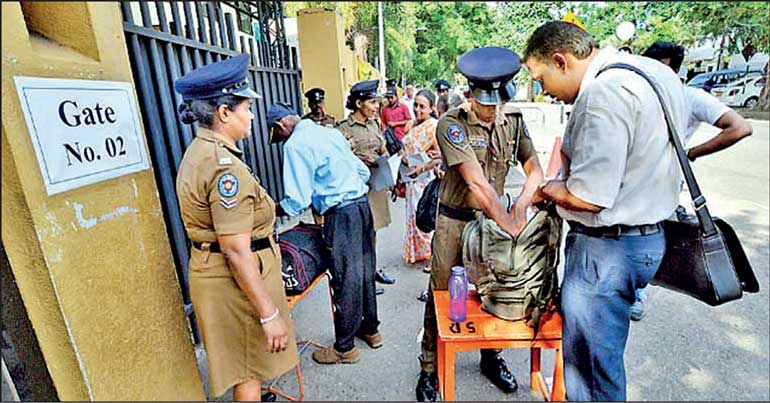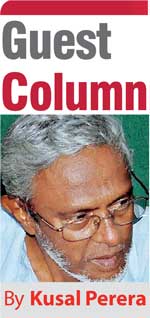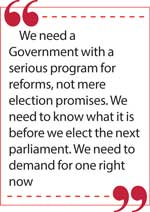Sunday Feb 15, 2026
Sunday Feb 15, 2026
Friday, 20 September 2024 00:30 - - {{hitsCtrl.values.hits}}

Whatever the results and whoever sits on the presidential chair on Sunday 22 September, future of Sri Lanka would not be favourably decided until a new parliament is elected – Pic by Shehan Gunasekara
 Now the countdown to the three-cornered presidential tussle is on days, not weeks. Perhaps in another three or four days, Presidential elections will be held on 21 September. That final result will be decided by the majority rural vote, seldom heard in major urban circles.
Now the countdown to the three-cornered presidential tussle is on days, not weeks. Perhaps in another three or four days, Presidential elections will be held on 21 September. That final result will be decided by the majority rural vote, seldom heard in major urban circles.
All these months and weeks, electoral trends were created, ballooned and dominated by the vociferous Sinhala-Buddhist urban middleclass voter, counting not more than 65% from around 4.5 million “urban voters” across the country. They may carry with them the lower social strata in urban areas. But can this urban middleclass carry along with them the larger majority of roughly 10.0 million ordinary rural voters leaving out the semi-urbans, to cast their vote as the urban middleclass want? The answer is very much outside text-book explanations. Let’s wait till 22 September to see, what the decision of the rural voter had been and how they have decided the final outcome.
In the past, outcome of presidential elections had been deciding the fate of parliamentary elections that follow and it had also been the other way round, when parliamentary elections came first. Then it had always been a two-horse race. This present three-cornered Presidential election may not be that. This has its peculiarity too in not having the political leadership that won previous presidential and parliamentary elections, as a frontrunner. It is assumed in all polling surveys, the badly beaten candidates at previous elections, now lead the present presidential race.
Fact remains, they all need 4 to 6 million additional votes to end up winning the race with 50 + 1 on the first count, if 80% of the 17.1 million registered voters go to polls. And they all need to bundle that additional number from the 6.8 million votes the winning alliance polled at the 2020 August parliamentary elections. That alliance is also expected to retain a fair number with them, leaving about 5 million for other mainstream candidates to grab in full or as shares.
Ordinary voter remains ignorant about the second preference
This in all probability would want a second count, in an electoral culture the second preference has not been in use in any of the past presidential elections. Ordinary voter remains ignorant about the second preference and how to use it. Demanding they use the second preference this Presidential election may increase the percentage of “spoilt votes” more than providing additional votes for the two leading contestants.
Whatever the results and whoever sits on the presidential chair on Sunday 22 September, future of Sri Lanka would not be favourably decided until a new parliament is elected. This present parliament has no legitimacy after its mandate was forfeited to a single MP who had no mandate to be in parliament except in the national list, nominated by his political party. This parliament has no mandate to continue with an ad hoc regime of MPs who only want to hold on to political power totally violating the political choice of the voter preference and is not responsible to the people.
There is no debate, electing a new president would provide new space for a new journey. That new space has to be taken over by a “new government” elected by the people. President is not the government though s/he would chair meetings of the cabinet of ministers, according to the Constitution. Manipulations as in 2015 January cannot provide for any government with any decency, especially with this parliament. This parliament anyway stands to be dissolved in less than a year from now in 2025 July. Thus, I doubt there would be objections to holding a parliamentary election at the earliest, IF people want a decent and a disciplined Sri Lanka, post 2024 Presidential elections.
What thereafter would be important is, on what mandate the parliament would be elected to have a futuristic government installed. Now that the Presidential election is closing up in a few days, this should immediately become the most vital subject for social dialogue. Extremely vital, as this country despite a literacy rate of over 93%, has never voted in parliament elections as a literate polity. Never voted to establish a government on a “program for social development”. At all elections including the present, majority votes had been and is “anti-incumbent” protest votes, adopting different political shades and empty slogans.
Experimenting with a “new face”
 Every presidential and parliamentary election had been about experimenting with a “new face”. Every presidential experiment with new “individuals” has proved a major disaster. Check back on 1988 elections, 1994, 2005, 2015 and 2019 elections as well. No “new face” changed anything for the better, though some stand firm on “war victory” as a historic achievement. But that Sinhala-Buddhist extremism nurtured in the name of “patriotism” brought the whole country into bankruptcy with mega corruption, accelerated by the 2019 Presidential election.
Every presidential and parliamentary election had been about experimenting with a “new face”. Every presidential experiment with new “individuals” has proved a major disaster. Check back on 1988 elections, 1994, 2005, 2015 and 2019 elections as well. No “new face” changed anything for the better, though some stand firm on “war victory” as a historic achievement. But that Sinhala-Buddhist extremism nurtured in the name of “patriotism” brought the whole country into bankruptcy with mega corruption, accelerated by the 2019 Presidential election.
“What then?” is the question that demands serious social attention. The answer is quite simple. In this selfish society that looks for personal solutions with no social obligations, electing individuals as presidents, backed by an elected government with no serious development program, allowed a 45-year-long failure with this wholly corrupt free market economy. It is proved beyond doubt, with all tax benefits and State patronage, FDIs have not been able to provide Sri Lanka enough forex to even bridge the annual external trade deficit. In 2023, personal remittances from migrant labour were $ 6 billion, while export manufacture from FDIs had brought only about 5 billion leaving traditional exports like tea, rubber and coconut out of the list.
We certainly lack serious programming for the future. This fixation on economic bankruptcy has to also account for the tragedy this society is in with rape of women and minors, sexual and physical abuse of children in thousands annually, on contract killing, extortions, drug trafficking with over one million unsettled court cases and overcrowding of the prison system by over 230 percent. All this prove there is no “law and order” in this country. All this prove economic solutions cannot be implemented with a State as dysfunctional as this today.
The answer therefore is, we need a Government with a serious program for reforms, not mere election promises. We need to know what it is before we elect the next parliament. We need to demand for one right now.